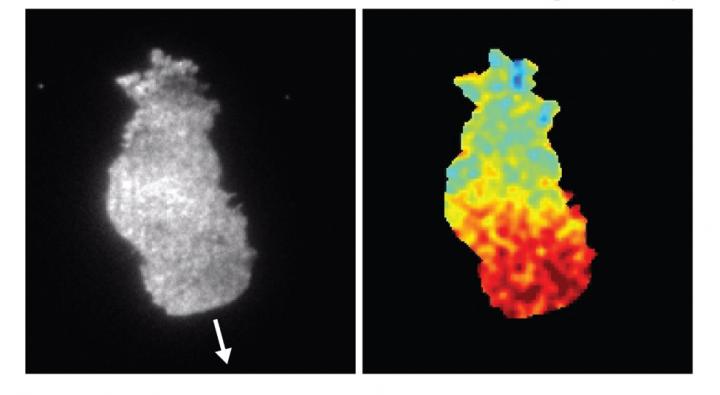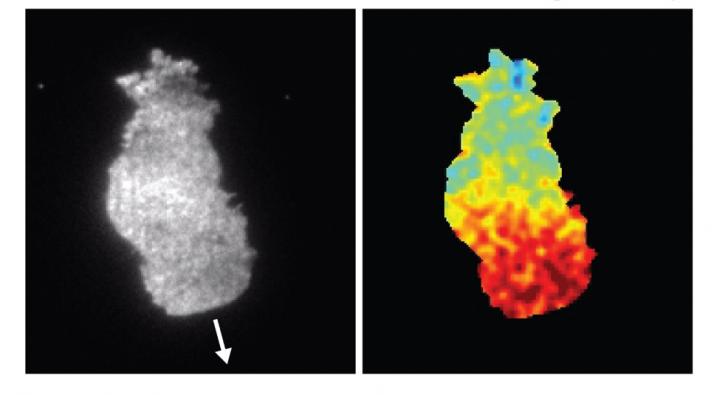
Credit: Collins lab, UC Davis
Assistant Professor Sean Collins, Department of Microbiology and Molecular Genetics in the UC Davis College of Biological Sciences, has received a $1.5 million award from the National Institutes of Health to advance the development of "smart" immune cells for therapies to treat cancer and other diseases. The five-year NIH Director's New Innovator Award aims to provide new insight into how to engineer immune cells to control their recruitment and response to tumors.
"Immune cells are emerging as major tools for the next generation of cancer therapies," said Collins. "Our project is aimed at understanding how immune cells channel information downstream of inputs from the cell surface to control different behaviors."
Guiding the response of immune cells
White blood cells, which defend against infections and tumors, use chemical roadmaps to navigate to sites in the body where they are needed. Not only do white blood cells respond to attacks, but they have the ability to amplify an attack signal and recruit other immune cells to join the fight.
This signal amplification allows the immune system to respond explosively to overpower threats. However, if too many white blood cells answer the call, the system can spiral out of control creating excessive body-wide responses such as fever, difficulty breathing, seizures and other problems.
As common side-effects of emerging cell-based cancer therapies, these responses can be dangerous and even fatal for the patient. One challenge in developing immune cell therapies is to strike a balance between the beneficial anti-tumor responses and negative side effects due to signal amplification.
By targeting smart cells to respond in a specific and controlled manner and limiting their ability to amplify the attack signal, Collins hopes the cells will be able to work more effectively to fight tumors and avoid damaging the body's healthy cells.
Scientists are still unraveling the basic mechanisms that control the behavior of individual immune cells, such as how they follow chemical trails to reach their targets and how they decide whether to call in reinforcements.
Taking a systematic, genome-wide approach, Collins' team will break down the complexity of an immune cell's signaling network, developing maps that reveal the different response pathways within the cell.
In particular, the team will look for the key genes that act as "intersections" controlling the balance between the different aspects of the cell's final response. These maps will serve as the blueprints for the creation of smart cells which can be programmed to seek and destroy tumors.
"We are still at a very early stage in understanding how to control these cells and balance activity directed against the tumor without dangerous side effects to healthy cells," Collins said.
Putting smart cells to the test
With greater understanding about the genes that regulate the response pathways of immune cells, Collins' group will develop strategies to test and fine-tune the engineered cells in a living organism. For such studies, zebrafish are a model organism that offer a promising opportunity.
Like humans, zebrafish have white blood cells that patrol and protect the body. Zebrafish embryos are also transparent, making it possible to directly observe and photograph the movement and behaviors of immune cells' responses to attacks in real-time.
"We're excited to see the results of Sean's research revealing how immune cells control their movements and how they can be redirected to respond to tumors," said Mark Winey, dean of the College of Biological Sciences. "Sean's work on immune system responses is one of many research programs in the College of Biological Sciences with potential impacts on our understanding and treatment of cancer."
Collins' award is one of 55 "High Risk, High Reward" New Innovator Awards announced by NIH Oct. 5. The NIH Director's New Innovator Award supports "exceptionally creative early career investigators who propose innovative, high-impact projects." Established to create support for unconventional approaches, the award pursues major opportunities and gaps in biomedical research that require cross-collaboration of NIH Institutes and Centers to succeed.
###
Collins recently received the Kimmel Scholar Award from the Sidney Kimmel Foundation for his research on immune cell responses.
Media Contact
Andy Fell
[email protected]
530-752-4533
@ucdavisnews
http://www.ucdavis.edu
Original Source
http://blogs.ucdavis.edu/egghead/2017/10/05/smart-immune-cells-emerging-cancer-therapy-research-uc-davis-boosted-nih-award/





